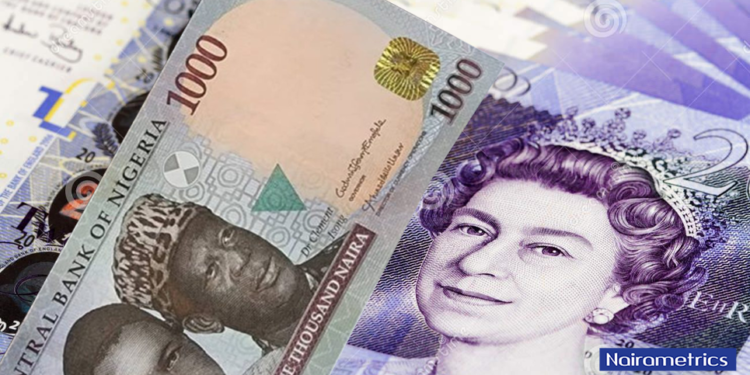The naira started Thursday’s session at the lower end of its range versus the British pound sterling and broke through the 2,000 barrier. Meanwhile, the pound hit a four-month high against the US dollar as data indicated that the UK economy expanded faster than anticipated in May, lessening the likelihood of an August rate cut.
The Office for National Statistics released flash statistics on Thursday, indicating that the UK economy grew by 0.4% in May.
Following the announcement, the value of the British pound surged to a four-month high against the US dollar.
The pound sterling traded at N2,020 against the local currency in the black market despite improved conditions in Nigeria’s FX assets held by the CBN.
The pullback in the naira comes at a time when Nigeria’s reserves reached $35.05 billion as of July 8, 2024, the highest under Tinubu’s presidency.
The depreciation of the naira in NAFEM coincided with a recent increase in price volatility, with the widening exchange rate disparity once again.
The Nigerian currency depreciated by N29 to trade at N1,561/$1 late Wednesday, down from N1,532/$1 on Tuesday, according to data from the Nigerian Autonomous Foreign Exchange Market (NAFEM).
The strong British economy boosts the pound’s fortune
The British economy bounced back strongly from a temporary recession in the first quarter but stagnated in April. In May, there was an increase in output in the construction and production sectors, up 1.9% and 0.2%, respectively, as the UK’s largest services sector continued to grow at a rate of 0.3%.
According to LSEG statistics, the British pound was up 0.05% against the US dollar at $1.2859 by 7:17 a.m. in London, the highest level since March 8, 2024. As Prime Minister Keir Starmer begins his first week in office, the newly elected Labour Party is expected to oversee a fairly sound economy.
A substantial parliamentary majority and business-friendly rhetoric from the party have led observers to characterize the administration as generally favourable to assets based in the United Kingdom.
The markets expect the Labour cabinet to prioritize high-impact, low-cost policies that, when combined, might assist in releasing much-needed private investment, in line with its recent flurry of pro-growth pledges amid stretched public finances.
Last week, Labour’s newly appointed Finance Minister Rachel Reeves announced plans to change planning regulations, lift the moratorium on new onshore wind farms in England, and impose mandatory house-building objectives.
She announced the establishment of a £7.3 billion national wealth fund on Wednesday to attract private sector funding for infrastructure projects in the United Kingdom.
British pound outlook
Ultimately, currency traders are keeping an eye out for what may be an exhaustion bottom in the upcoming weeks.
If the price corrects lower, rallies should be restricted to below $1.2857. Closing below the weekly open is required to initiate a substantial fall.
Initial support is provided by 2024 yearly open at $1.2731 against the haven currency and the swing low from February 2019 at $1.2773; pullbacks must be limited to this level for the monthly climb to be sustained. Now, wider bullish invalidation is raised to $1.2664, the open for July.















